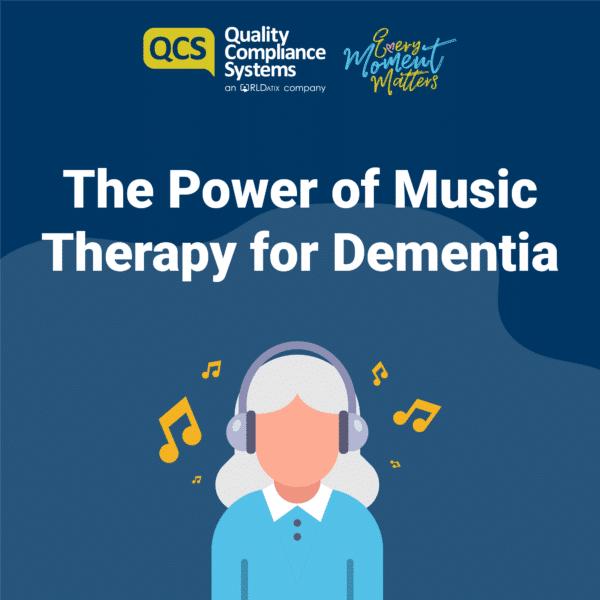20 odd years ago whilst working as a carer alongside completing my Music degree, I chose to combine the two and completed my dissertation on Music Therapy in Dementia Care. This is by no means a new principle, but back then it was not used in mass. It wasn’t unusual for staff to feel foolish or out of their comfort zone creating a music session, getting out tambourines or triangles for people to tap away to. Fast forward to 2024 and gratefully many providers are continuing to benefit from implementing music and the joy it can bring to their care settings. I wanted to share the experience of completing my study, and the journey that it took me on as a young, relatively inexperienced carer and how the process certainly opened my eyes to the effect and difference it can make to someone’s care experience, particularly a person with a dementia diagnosis.
The three individuals that completed the study (with consent from their POA) all had different types of dementia as well as being at different stages. This process is one that I will never forget and the impact that the sessions had was profound.
One lady had end stage dementia, I will call her Iris, nonverbal and receiving bed care only. Iris lived with her family and had a beautiful room with French doors overlooking the garden. On a nice day the doors could be opened, and she could feel the breeze on her face. As carers we provided three double up domiciliary care visits a day and the family supported her outside of these times. I had gotten to know them well and had also acquired a picture of the sort of music that Iris would have enjoyed during her younger days. The sessions with Iris were very simple, I would play music to her of songs that were known to her and monitor for any changes in her both physically and with her mood. The results were astonishing, Iris would start to mumble and even smile which was unheard of, even with close relatives. I played ‘In the Mood’ by Glen Miller she raised her hands slightly as if she was attempting to tap the rhythm.
Now, not every session was as glorious as this, there were times when Iris stayed asleep or did not engage as noticeably, but on the times that she did, wow! It was incredible to be a part of and was something that in essence, really was so simple to implement. Leaving that house with Iris’ smile imprinted on my memory was one of the best feelings I’ve ever had.
It is true, smiling is infectious, and it really is, it can change the course of your day (as well as someone else’s). This is true of music as well, it can amplify and alter our moods, invoke memories and transport us back to a place we had long forgotten, it is one of the ultimate memory nudgers!
Having had this experience encouraged me to never give up, there are always different things to attempt with our service users and it needn’t always be a struggle. Tomorrow is a new day; we can start over and give it another shot. For the moments that work, celebrate – there are times when these are fleeting but they remain valuable successes.
How to harness the power of music therapy for dementia
At QCS, we’ve seen firsthand how music therapy for those living with dementia can transform their lives. It’s incredible to witness how a simple melody can help people rediscover ‘lost’ memories, enhance their sense of self, boost their moods, and stimulate their senses. With many of our team members having backgrounds in care, we are passionate believers in the power of music to enrich the lives of those we support. Here are a few things we’ve learned along the way.
Make every moment count
We’ve teamed up with NAPA to launch Every Moment Matters, an initiative dedicated to celebrating the amazing work you do every day. We’re highlighting the crucial role of activities in care delivery and offering downloadable activity packs to help you create those special moments that truly matter. One of our favorite resources is the ’arts and culture’ activity pack. It’s packed with actionable, step-by-step guidance on everything from organizing karaoke sessions to sharing cherished memories through music and movement. Music therapy for dementia taps into multiple parts of the brain, making it an exceptionally effective way for those living with dementia to reconnect with poignant and meaningful memories.
Don’t miss out on this valuable resource. Get your hands on the activity pack here and see the magic of music in action for yourself.
Unlock memories with personalised playlists
Personalised playlists are a powerful tool in dementia care, offering numerous psychological benefits. Scientific research has shown that music can act as a ‘mental ladder,’ enabling those with dementia to reconnect with treasured memories. Inspired by this research, Playlist for Life, founded by broadcaster Sally Magnusson, helps individuals create personalised playlists that resonate with their personal history. This approach not only brings joy but also significantly aids in reminiscence activities, fostering a stronger self-identity among dementia patients.
To support this, the QCS PAL Instrument is an invaluable tool for carers and activity providers. While it doesn’t create playlists, it helps carers assess the cognitive levels of individuals with dementia—whether they are at a planned, exploratory, sensory, or reflex level. This understanding enables carers to tailor their approach and choose or create playlists that are most beneficial for each individual. By leveraging the QCS PAL Instrument, care professionals can ensure that the music chosen is appropriate and impactful, making every musical interaction meaningful. At QCS, we provide the expertise and tools to help you enrich the lives of those with dementia, fostering deeper connections and enhancing their overall well-being.
More where that came from
Harnessing the power of music therapy for people living with dementia is just one way to enhance the lives of those you support. At QCS, we are committed to providing you with the tools and knowledge needed to deliver exceptional care. Stay updated with the latest insights and resources by visiting our blog. There, you’ll find valuable content designed to help you continue making a positive impact in the lives of your service users. Join us on this journey and discover more ways to enrich your care practice.






